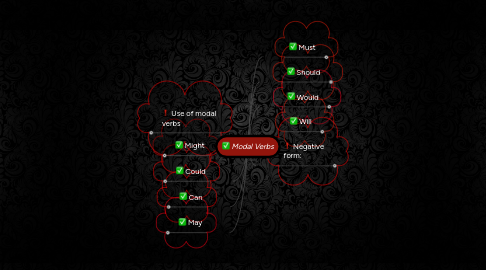Modal Verbs
by Jorge Luis Hurtado Boscan

1. Could
1.1. Could indicates possibility or ability in the past.
1.2. - I could swim long distances when I was young - It could have been worse - Joe could speak Spanish when he was young
1.3. You can also use "could" for future possibilities. - I think it could rain later
2. Can
2.1. Can, is a modal verb that expresses ability.
2.2. - I can play the guitar very well - I can speak French, Spanish and Russian like a native. - Bill and Tom can’t help you
2.3. In interrogative sentences, the use of "can" may request permission or inquire about possibilities. - ¿Can I have a glass of water?
3. May
3.1. May indicates permission and possibility.
3.2. - It is cloudy, it may rain later. - ¿May I come later? - It may be better to finish this now, rather than wait until tomorrow.
3.3. In interrogative sentences, the use of "may" is more polite than "can" or "could". ¿May I have a glass of water? ¿May I leave now?
4. Might
4.1. It might expresses remote possibility. It is also used to indicate possibilities in the present or the future. In these cases, it is synonymous with "may".
4.2. - I would bring an umbrella, it might rain later - It might be better to finish this now, rather than wait until tomorrow
4.3. It can also be used as "may", to ask permission or make polite requests
5. Use of modal verbs
5.1. Modal verbs are used to express one embodiment, skill, ability, need or other condition.
6. Must
6.1. Must is also a modal verb. It indicates an obligation, prohibition or need. In some case it may indicate probability
6.2. - You must read this book, it's fantastic. - You must brush your teeth twice a day - Peter is not here. He must be sick because he is never absent
6.3. You can also use "must" to indicate probability or take something. - It must be difficult to learn a new language as an adult.
6.4. You may also use "must" for rhetorical questions. - ¿Must she talk so much?
7. Would
7.1. It is used to declare a preference would and to ask for something very formally.
7.2. - I would like to go to Brazil someday - ¿Would you be so kind to turn the radio off, please? - I would like a beer and my wife would like a glass of wine please
7.3. Note: "would" Used in conditional sentences.
8. Will
8.1. "Will" means will or determination.
8.2. - I will help you - We will learn English
8.3. "Will" is used in interrogative sentences for information, a favor or options. - ¿Will you help me move?
9. Should
9.1. Should expresses moral obligation and sometimes advice.
9.2. - I should call my parents more often - You shouldn’t work so hard
9.3. "It should" is used in interrogative sentences to ask if there is an obligation or to ask for a recommendation. - ¿Should we leave a tip?
10. Negative form:
10.1. will = will not / won't can = cannot / can't could = could not / couldn't should = should not / shouldn't may = may not might = might not must = must not / mustn't shall = shall not / shan't would = would not / wouldn't ought to = ought not to / oughtn't to


